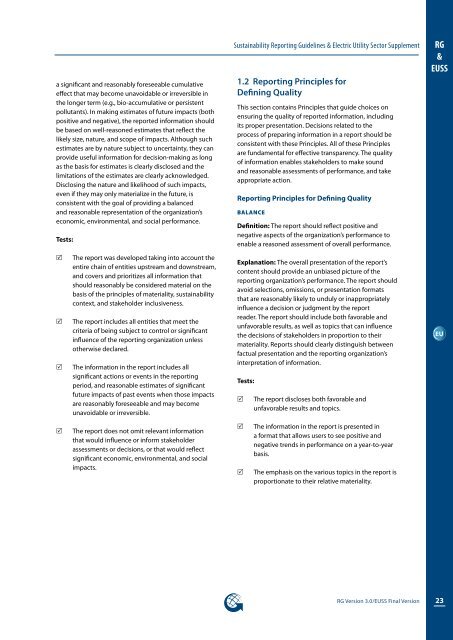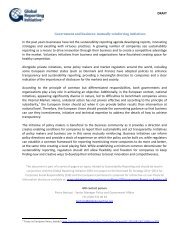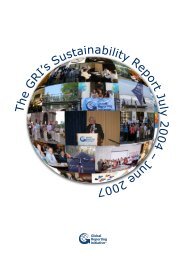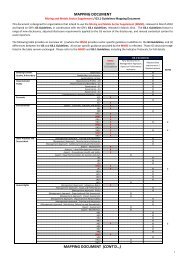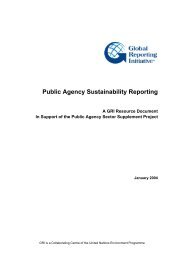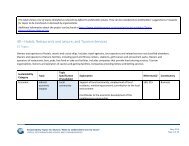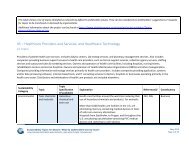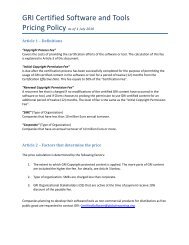Electric Utilities Sector Supplement - Global Reporting Initiative
Electric Utilities Sector Supplement - Global Reporting Initiative
Electric Utilities Sector Supplement - Global Reporting Initiative
Create successful ePaper yourself
Turn your PDF publications into a flip-book with our unique Google optimized e-Paper software.
a significant and reasonably foreseeable cumulative<br />
effect that may become unavoidable or irreversible in<br />
the longer term (e.g., bio-accumulative or persistent<br />
pollutants). In making estimates of future impacts (both<br />
positive and negative), the reported information should<br />
be based on well-reasoned estimates that reflect the<br />
likely size, nature, and scope of impacts. Although such<br />
estimates are by nature subject to uncertainty, they can<br />
provide useful information for decision-making as long<br />
as the basis for estimates is clearly disclosed and the<br />
limitations of the estimates are clearly acknowledged.<br />
Disclosing the nature and likelihood of such impacts,<br />
even if they may only materialize in the future, is<br />
consistent with the goal of providing a balanced<br />
and reasonable representation of the organization’s<br />
economic, environmental, and social performance.<br />
Tests:<br />
Sustainability <strong>Reporting</strong> Guidelines & <strong>Electric</strong> Utility <strong>Sector</strong> <strong>Supplement</strong><br />
1.2 <strong>Reporting</strong> Principles for<br />
Defining Quality<br />
This section contains Principles that guide choices on<br />
ensuring the quality of reported information, including<br />
its proper presentation. Decisions related to the<br />
process of preparing information in a report should be<br />
consistent with these Principles. All of these Principles<br />
are fundamental for effective transparency. The quality<br />
of information enables stakeholders to make sound<br />
and reasonable assessments of performance, and take<br />
appropriate action.<br />
<strong>Reporting</strong> Principles for Defining Quality<br />
Balance<br />
Definition: The report should reflect positive and<br />
negative aspects of the organization’s performance to<br />
enable a reasoned assessment of overall performance.<br />
RG<br />
&<br />
EUSS<br />
R<br />
R<br />
R<br />
The report was developed taking into account the<br />
entire chain of entities upstream and downstream,<br />
and covers and prioritizes all information that<br />
should reasonably be considered material on the<br />
basis of the principles of materiality, sustainability<br />
context, and stakeholder inclusiveness.<br />
The report includes all entities that meet the<br />
criteria of being subject to control or significant<br />
influence of the reporting organization unless<br />
otherwise declared.<br />
The information in the report includes all<br />
significant actions or events in the reporting<br />
period, and reasonable estimates of significant<br />
future impacts of past events when those impacts<br />
are reasonably foreseeable and may become<br />
unavoidable or irreversible.<br />
Explanation: The overall presentation of the report’s<br />
content should provide an unbiased picture of the<br />
reporting organization’s performance. The report should<br />
avoid selections, omissions, or presentation formats<br />
that are reasonably likely to unduly or inappropriately<br />
influence a decision or judgment by the report<br />
reader. The report should include both favorable and<br />
unfavorable results, as well as topics that can influence<br />
the decisions of stakeholders in proportion to their<br />
materiality. Reports should clearly distinguish between<br />
factual presentation and the reporting organization’s<br />
interpretation of information.<br />
Tests:<br />
R<br />
The report discloses both favorable and<br />
unfavorable results and topics.<br />
EU<br />
R<br />
The report does not omit relevant information<br />
that would influence or inform stakeholder<br />
assessments or decisions, or that would reflect<br />
significant economic, environmental, and social<br />
impacts.<br />
R<br />
R<br />
The information in the report is presented in<br />
a format that allows users to see positive and<br />
negative trends in performance on a year-to-year<br />
basis.<br />
The emphasis on the various topics in the report is<br />
proportionate to their relative materiality.<br />
RG Version 3.0/EUSS Final Version<br />
23


